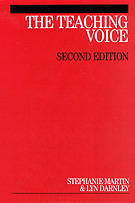About the Association
Archived book reviews
 The Teaching Voice (2nd edition)
The Teaching Voice (2nd edition)
Stephanie Martin and Lyn Darnley
Whurr Publishers
Review by: Valerie Morton Specialist Speech and Language Therapist (Voice), Belfast City Hospital Trust. Royal College of Speech and Language Therapists' Advisor in Voice
It is hard to believe that eight years have elapsed since the first edition of The Teaching Voice by Stephanie Martin and Lyn Darnley. Time has moved on and so has relevant research. Hence "The Teaching Voice", second edition is a timely publication.
Since 1996, extensive research has been undertaken in the field of occupational voice. The authors have therefore modified the original text considerably to take account of these new developments and the updated version is required reading for anyone with an interest in occupational voice disorders.
This book aims to provide professional users, especially teachers and student teachers, with a framework to help them maintain good voice throughout their professional careers. The authors certainly achieve their aim. Information is presented in an extremely logical manner and in a style which is easy to absorb.
Vocal awareness is developed by considering the effects of teaching on voice and the role of external stress factors. To help promote more effective use of voice the function and structure of the vocal process is outlined and the importance of body alignment discussed. Voice use is also reviewed within the context of speech and language skills, communication and the varied speaking roles of the teaching profession.
The strength of this book lies in the links that are established between theory and practice. Four chapters are devoted to vocal health, effective classroom strategies and a variety of vocal exercises. By using this information and working on vocal skills, the reader can develop personal strategies to maintain a healthy voice and prevent potential vocal difficulties.
Reference is frequently made to the complacent attitude of teachers to voice problems, something that prevents them from seeking help with voice at the earliest opportunity. Readers are encouraged to help themselves by monitoring vocal quality, identifying and modifying problem areas instead of persevering and accepting the vocal difficulty as an inherent aspect of teaching which it is not. By doing this the individual has a greater chance of maintaining satisfactory voice despite the rigours of the classroom.
The wealth of experience and specialist knowledge of the two authors have combined to produce a comprehensive text. Although the book is aimed primarily at teachers it will appeal more widely. It can therefore be strongly recommended for all professional voice users, voice teachers and speech and language therapists.
More archived content online
Disclaimer
Neither the British Voice Association nor the Editor can be held responsible for errors or any consequences arising from the use of information contained in its newsletters (or extracts from its newsletters published online); the views and opinions expressed do not necessarily reflect those of the British Voice Association (BVA) or the Editor, neither does the publication of advertisements constitute any endorsement by the BVA or Editor of any products or services featured.

 Join us Now!
Join us Now! our newsletter
our newsletter free voice care leaflets & information – download here
free voice care leaflets & information – download here Help our work by donating while you shop
Help our work by donating while you shop